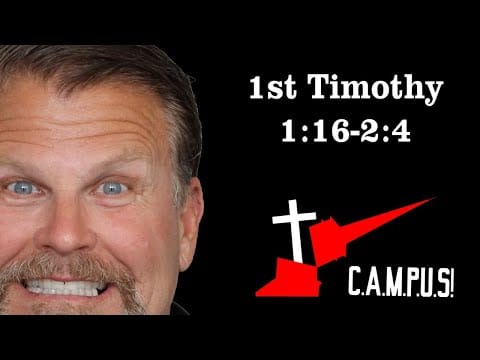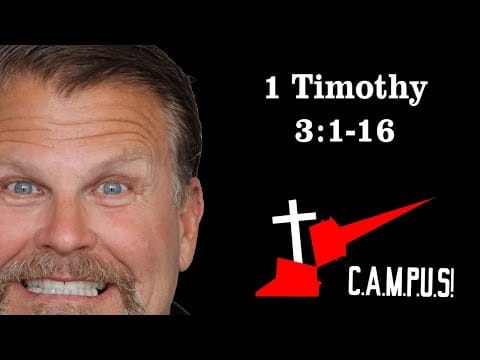
1 Timothy 3:16 Bible Teaching
Paul emphasizes church conduct and godliness mystery; Shawn critiques 1 Timothy 3:16's translation, arguing against Trinitarian interpretation, focusing on Jesus' spiritual role.

Paul emphasizes church conduct and godliness mystery; Shawn critiques 1 Timothy 3:16's translation, arguing against Trinitarian interpretation, focusing on Jesus' spiritual role.

Shawn's teaching highlights election, predestination, and grace, emphasizing salvation through faith as a gift for all, with God's chosen fulfilling His purposes.

Shawn's teaching on 2 Thessalonians 2:1-12 highlights the defeat of the "lawless one" by the Lord's words, linking Nero to the Antichrist through historical and scriptural analysis.

Paul's teachings in 1 Timothy 3 highlight the moral and behavioral qualifications for bishops and deacons, emphasizing responsibility, integrity, and spiritual leadership without hierarchy.

Shawn's teaching analyzes 2 Thessalonians 2:1-12, focusing on the "Man of Lawlessness" and "falling away" before Christ's return, emphasizing vigilance against deception.

Paul's teachings stress prayer, free will, and salvation through Christ, while Shawn's focus on modesty, gender roles, and cultural context highlights evolving norms.

Paul commends Thessalonians' faith amid persecution, linking trials to God's judgment and future reward. Emphasizes justice at Jesus' return, aligning with historical events.

Paul teaches Christ's mission to save sinners, urges Timothy to uphold faith, warns against sin's deceit, emphasizes prayer for all, and respect for authority.

Paul's teaching in 1st Timothy focuses on love from a pure heart, good conscience, and sincere faith, transcending the Law, which guides the unrighteous, emphasizing spiritual maturity.

The teaching highlights that the Law's purpose is to guide believers to agape love, pure heart, good conscience, and genuine faith, transcending legalism through Christ.

Paul's prayer in 1 Thessalonians 5:23 highlights sanctification of spirit, soul, and body, distinguishing trichotomy from dichotomy, emphasizing spiritual rebirth and growth.

Yeshua's ascension in Luke 24 symbolizes his divine role; Shawn highlights Jesus' deification post-resurrection. Timothy aids Paul, addressing early church issues.

Yeshua's teachings in Luke 24 emphasize free will, spiritual insight through scripture, the importance of clear biblical teaching, and the global mission of repentance and forgiveness.

Paul reassures Thessalonians about Yeshua's unexpected return, urging vigilance as "children of light," emphasizing faith, love, hope, and salvation, not wrath.

Shawn's teaching emphasizes Yeshua's resurrection as central to Christian faith, supported by Old and New Testament scriptures, post-resurrection appearances, and prophetic fulfillment.

Sanctification requires abstaining from fornication, nurturing the spirit through love, patience, and kindness. Emphasizes Spirit-led transformation over legalism.

Shawn's teaching highlights the aftermath of Jesus' crucifixion, the role of women like Mary Magdalene, the fulfillment of prophecies, and the significance of the resurrection.

Paul emphasizes holiness, abstaining from fornication, and Spirit-led transformation. Shawn focuses on spiritual identity, Agape love, and overcoming fleshly desires through the Spirit.

Paul's teachings to the Thessalonians emphasize steadfast faith, love, holiness, and spiritual growth, urging believers to live blamelessly, guided by God's transformative power.

Shawn's teaching on Luke 23:41-43 highlights the penitent thief's faith, Jesus' assurance of paradise, the crucifixion's darkness, and the fulfillment of prophecy.

Paul and Shawn discuss early Christian persecution, the dangers of religious zeal, and the importance of faith and love. They emphasize avoiding dogmatism, maintaining faith amidst suffering, and prioritizing spiritual stability.

Simon helps Jesus carry the cross, highlighting communal faith support. Crucifixion context, Jesus' warnings, humility, forgiveness, and spiritual kingship emphasized.

Shawn explores Pilate's dilemma, Barabbas's release, Pilate's wife's dream, and the crowd's role in Jesus's crucifixion, emphasizing Jesus as ultimate truth and suffering servant.

Paul's teaching: live righteously, self-sufficiently, share Gospel and soul, walk worthy of God, focus on faith in Jesus, love others, internal devotion, discern truth.

Paul's teachings in 1 Thessalonians highlight election for service, not exclusion, emphasizing spreading faith with sincerity, love, and selflessness, despite adversity.

Jesus accused of rebellion, not paying tribute, claiming kingship; Pilate, Herod find no fault. Jesus' kingdom not earthly. Pilate proposes release, tension persists.

Paul and Silas preached in Thessalonica, converting Jews and Greeks despite opposition. Paul emphasized unity in God and Jesus, nurturing faith, love, and hope.

Shawn's teaching covers Judas' betrayal, Peter's denial, Jesus' peaceful mission, and unjust trial, emphasizing love, peace, and dedication over violence.

Jesus warns Peter of Satan's challenge, prays for his faith, and highlights his future role. Peter's true conversion occurs at Pentecost. Jesus instructs disciples to prepare for trials, emphasizing active partnership with God. In Gethsemane, Jesus prays, submits to God's will, and is strengthened by an angel. Atonement is linked to the crucifixion, not Gethsemane. The Critical Text influences modern translations, with debates on legitimacy of certain passages. Jesus, as "Son of Man," highlights humility, and Judas betrays him with a kiss.

Shawn's teaching on Colossians 3:20 stresses children's obedience to parents, fostering mutual honor. Fathers should avoid provoking anger. Emphasizes living for Christ, impartial judgment, equality, and meaningful communication. Highlights key figures like Epaphras and Aristarchus, and Paul's personal touch in letters.